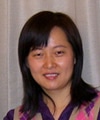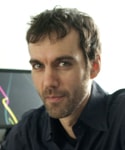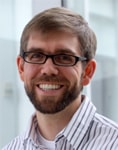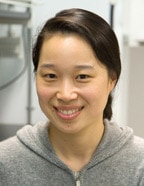Agilent Early Career Professor Award
Previous Agilent Early Career Professor Award Winners
2023 Agilent Early Career Professor Award Winner
2023 Focus: Contributions to the development of live cell analytical tools to identify and measure novel critical quality attributes (CQA) to advance biomanufacturing applications.

Ajit Divakaruni, Ph.D.
Assistant Professor
University of California, Los Angeles
Department of Molecular and Medical Pharmacology
Dr. Divakaruni is an Assistant Professor at the University of California, Los Angeles. His research aims to understand how specific metabolic pathways can control cell function and fate, and he is internationally recognized as an expert in functional mitochondrial measurements.
Dr. Divakaruni earned his B.S. in Biochemistry and Applied Mathematics from the University of Arizona in 2006. He then conducted his graduate research in mitochondrial bioenergetics under the supervision of Dr. Martin Brand at University of Cambridge (UK) and earned his Ph.D. in 2011. He subsequently joined the University of California, San Diego as a postdoctoral fellow under the supervision of Dr. Anne Murphy, focusing on mitochondrial pharmacology with an emphasis on assay development. In 2017, he joined the UCLA Department of Molecular and Medical Pharmacology in the David Geffen School of Medicine.
Dr. Divakaruni’s laboratory aims to develop mitochondrial proteins and metabolic pathways as therapeutic drug targets. His research integrates bioenergetics, analytical chemistry (metabolomics and 13C isotope tracing), live cell imaging, and functional assays to comprehensively characterize cell metabolism in response to drug candidates, genetic perturbations, and physiologically relevant stimuli. Current projects include studying the crosstalk between metabolism and innate immunity as well as examining how adjusting the balance between sugar, fat, and amino acid oxidation can affect metabolic and neurological disease. The development and refinement of functional mitochondrial measurements is also central to his work, and his laboratory places an emphasis on protocols and ‘roadmap’ manuscripts to help others plan experiments and avoid common pitfalls.
He has been recognized with numerous awards and research grants including those from the Flinn Foundation, Marshall Aid Commemoration Commission, National Science Foundation, National Institutes of Health, and the W.M. Keck Foundation.
2022 Agilent Early Career Professor Award Winner
2022 Focus: Contributions to the development of Artificial Intelligence and Machine Vision technologies for intuitive Collaborative Robots (Cobots) to address demands for a flexible next-generation workforce in manufacturing applications.

Stefanos Nikolaidis
Assistant Professor
Department of Computer Science
Viterbi School of Engineering
University of Southern California
Dr. Nikolaidis completed his Ph.D. at CMU’s Robotics Institute and received a M.S. from MIT, a M.Eng. from the University of Tokyo and a B.S. from the National Technical University of Athens. He has also worked as a research associate at the University of Washington, as a research specialist at MIT and as a researcher at Square Enix in Tokyo.
Dr. Nikolaidis has made seminal contributions in the field of human-robot collaboration. His well-known work on human-robot cross-training during his graduate studies at MIT was the first work that underlined the importance of learning and accounting for human preferences in collaborative tasks, and it spawned a large line of research in preference learning for human-robot collaboration. Dr. Nikolaidis’ subsequent work at CMU on human-robot mutual adaptation provided the mathematical foundations for a new subfield in human-robot interaction, where robots actively affect the mental states and actions of their human counterparts.
Dr. Nikolaidis joined the University of Southern California Viterbi School of Engineering in 2018 as an Assistant Professor of the Computer Science Department. He directs the ICAROS lab, which focuses on theoretical and experimental frameworks that enhance the robustness and effectiveness of human-robot interactions. With support from the Agilent Early Career Professor Award, Dr. Nikolaidis’ team is developing algorithms that enable intuitive collaborative robots to efficiently support human workers in large-scale, real-world manufacturing tasks. This research aims towards facilitating the adoption of robots in the workplace, substantially enhancing human productivity and reducing ergonomic exposure.
Dr. Nikolaidis was recognized with an NSF CAREER award in 2022 for his work on “Enhancing the Robustness of Human-Robot Interactions via Automatic Scenario Generation." His research has also been recognized with an oral presentation at the Conference on Neural Information Processing Systems (NeurIPS) and best paper awards and nominations from the IEEE/ACM International Conference on Human-Robot Interaction, the International Conference on Intelligent Robots and Systems, and the International Symposium on Robotics.
2021 Agilent Early Career Professor Award Winner
2021 Focus: Contributions to the development of breakthrough solutions to understand or manage immunological responses to infection, autoimmunity or cancer.

Jason Yang, Ph.D.
Assistant Professor and Chancellor Scholar
Ruy V. Lourenço Center for Emerging and Re-Emerging Pathogens
Department of Microbiology, Biochemistry, and Molecular Genetics
Rutgers New Jersey Medical School
Dr. Yang joined Rutgers New Jersey Medical School in 2019 as an Assistant Professor and Chancellor Scholar in the Ruy V. Lourenço Center for Emerging and Re-Emerging Pathogens and Department of Microbiology, Biochemistry, and Molecular Genetics. He leads a highly diverse research team focused on developing innovative therapies for chronic and infectious diseases using systems biology and synthetic biology approaches.
Dr. Yang received a B.S. in Biomedical Engineering from the Johns Hopkins University in 2005, with a second major in Electrical Engineering. He subsequently received his Ph.D. in Biomedical Engineering from the University of Virginia in 2012, working in the laboratory of Dr. Jeffrey Saucerman to study cellular mechanisms governing GPCR signaling dynamics in cardiac myocytes. Dr. Yang completed his postdoctoral training at the Massachusetts Institute of Technology and Broad Institute of MIT and Harvard, working in the laboratory of Dr. James Collins to study metabolic mechanisms of bactericidal antibiotic lethality. In addition to his academic training, Dr. Yang has also worked as a fellow with AstraZeneca Pharmaceuticals and Flagship Pioneering.
Dr. Yang’s multidisciplinary research program integrates the use of high-throughput, quantitative experimentation with network modeling and machine learning to accelerate the discovery of causal biological mechanisms. He has developed interpretable machine learning approaches for studying cellular phenotypes by applying biological network models as curated priors for informing machine learning models. The Yang Lab at Rutgers New Jersey Medical School is now extending these approaches to tackle the global health challenges posed by antimicrobial resistance, tuberculosis, and cardiovascular disease. With support from the Agilent Early Career Professor Award, Dr. Yang’s team is reverse engineering the biological circuitry of human macrophages to enable the development of immunoengineered synthetic macrophages that can be used to treat infections, autoimmunity, and cancer.
Dr. Yang additionally serves as Co-Chair of the Rutgers COVID Research Alliance within the Rutgers Center for COVID-19 Response and Pandemic Preparedness. He is the recipient of a NIH K99/R00 Pathway to Independence Award and University of Virginia Jill E. Hungerford Biomedical Sciences Prize.
2020 Agilent Early Career Professor Award Winner
2020 Focus: Contributions to the development of breakthrough live cell analysis technologies for measuring cellular responses to chemical/pharmaceutical treatments and genetic manipulations, including those that could advance cell-based therapies.

Carl DeSelm, M.D., Ph.D.
Assistant Professor
Dept. of Radiation Oncology
Washington University in St. Louis School of Medicine
Dr. DeSelm received a Bachelor of Science in Genetics, Cell, and Developmental Biology from Dartmouth College in 2004 and subsequently obtained his M.D. and Ph.D. degrees from Washington University in St. Louis in 2012. As a PhD student, Dr. DeSelm described a secretory pathway in the bone resorbing osteoclast that utilizes authophagy pathway proteins, and characterized the role of IL-17 in the pathogenesis of osteoporosis. His work led to a patent for a new therapy for osteoporosis. He then completed an Internship in Internal Medicine at Barnes-Jewish Hospital, St. Louis in 2013 followed up by a Residency in Radiation Oncology at Memorial Sloan Kettering Cancer Center, in 2017 where he got involved in the nascent field of CAR-T cell therapy by working in the laboratory of Dr. Michel Sadelain.
Dr. DeSelm joined the Washington University faculty in June 2018 as an assistant professor of Radiation Oncology with a laboratory in the Bursky Center for Human Immunotherapy and Immunology Programs. His current research and clinical interests focus on the engineering and clinical development of a new class of cell immunotherapy, engineering Antigen Presenting Cells (APC). This approach has the potential to address some of the limitations of the CAR T Cell therapy in the treatment of solid tumors. Likewise, he is interested in understanding and leveraging the role that radiation treatment can have to synergize with CAR-APC immunotherapy.
His outstanding work has been recognized by a number of awards, including the Young Investigator Award: American Society for Bone and Mineral Research in 2009, the Merit Award: Division of Biology and Biomedical Sciences, Washington University in St. Louis in 2011, the Needleman Pharmacology Award: Washington University in St. Louis in 2012, the Holman Research Pathway in 2017, the Early Independence Award from the NIH Director in 2018, and the Pancreatic Cancer SPORE Career Enhancement Program Award in in 2019. (press release)
2019 Agilent Early Career Professor Award Winner
2019 Focus: Contributions to the development of breakthrough artificial intelligence solutions advancing cancer diagnostics based on image analysis of pathology slides

Saeed Hassanpour, Ph.D.
Assistant Professor
Biomedical Data Science Department
Norris Cotton Cancer Center
Dartmouth College
Lebanon, NH
Dr. Hassanpour received a Bachelor of Science degree in Computer Engineering at Sharif University of Technology, Iran, in 2006. He subsequently received a Master in Computer Science from Waterloo University, Canada, in 2007 and his Ph.D. in Electrical Engineering and Biomedical Informatics from Stanford, CA, in 2012. He conducted postdoctoral training at the Radiology Department at Stanford and worked as a Research Engineer in Microsoft's Search Query Understanding Group at Mountain View, CA.
Dr. Hassanpour joined Dartmouth College Geisel School of Medicine in 2015 as Assistant Professor of the Biomedical Data Science Department. He also holds adjunct positions at the Department of Epidemiology and the Department Computer Science.
During his independent work at Stanford, at Microsoft and at Dartmouth, he has developed novel interpretable deep-learning approaches and data-driven methods for biomedical applications. This has resulted in numerous publications and 2 patents. The publication of his code for deep-learning methodology, called DeepSlide, was recognized as the winner of the Journal of Pathology Informatics Most Popular Article Award for 2017.
Dr. Hassanpour's current research focusses on the use of deep-learning technology for histopathological characterization of colorectal polyps to improve colon cancer screening, as well as on other cancer types and imaging modalities. He has an extensive network of clinical collaborations at Dartmouth, where he also counts on very strong institutional support. (press release)
2018 Agilent Early Career Professor Award Winner
2018 Focus: Contributions to the development and advancement of techniques and approaches for the study of the human microbiome, microbiome-host interactions and interaction between individual microbiome components

Dr. Christoph Thaiss, Ph.D.
Assistant Professor
Dept. of Microbiology
Perelman School of Medicine
University of Pennsylvania
Philadelphia
Dr. Thaiss received a Bachelor of Science from the University of Bonn, Germany, in 2010. He then moved to the US where he completed his Master in Immunology and Microbiology at Yale University in 2012 working with Richard Flavell and in collaboration with Wolf-Dietrich Hardt at Swiss Federal Institute of Technology (ETH) Zurich, Switzerland. This was followed up by a Visiting fellowship at the Broad Institute of MIT/Harvard that same year in Todd Golub's group and a short-term fellowship as visiting PhD student with Garry Nolan at Stanford University, in 2013. He then headed to the middle East where he worked with Dr. Eran Elinav at the Weizmann Institute of Science, Israel, where he was awarded a Ph.D. in Science in 2017.
Dr. Thaiss was recruited directly after completion of his Ph.D. by the University of Pennsylvania's Perelman School of Medicine in 2018, where he is Assistant Professor of the Microbiology Department and head of the Laboratory for Host-Microbiome Interactions.
Dr. Thaiss has made seminal contributions to the microbiome field. He has made use of multi-omic approaches, from sequencing-based metagenomics to mass spectrometry-based metabolomics analysis, as well as of a myriad of approaches and in vitro and in vivo systems to study the prokaryotic microbiome, its eukaryotic host and their interplay. His work have resulted in the discovery that the intestinal microbiome undergoes diurnal rhythms which strongly influence the circadian biology of the host. In addition, he has identified "memory"-like signatures in the microbiome after obesity, which predispose the host for recurrent weight regain. Recently, he has found that hyperglycemia directly causes loss of intestinal barrier integrity and microbiota containment, providing a mechanism for the enigmatic association between obesity and chronic multi-organ inflammation. He has also provided evidence that support the therapeutic potential of "post-biotics", which are microbiota derived metabolites with a direct effect on the host and the host-microbiome interactions with tremendous impact on human health and disease.
His outstanding work has been recognized by a number of awards, including the Innovation Award of the German Medical Association in 2017, the Harold M. Weintraub Graduate Student Award for outstanding achievement during graduate studies in the biological sciences in 2017, and the John F. Kennedy prize for excellent doctoral work, Feinberg Graduate School, Weizmann Institute of Science in 2017. (press release)
2017 Agilent Early Career Professor Award Winner
2017 Focus: Contributions to the development and advancement of techniques for the detection of nucleic acids, proteins, or other biomolecules in the context of Liquid Biopsy and its utilization for early detection, characterization and surveillance of cancer and other diseases and conditions.

Dr. Gary J. Patti, Ph.D.
Associate Professor, Department of Chemistry
Arts and Science
Washington University in St. Louis
Dr. Patti received a B.A. in Chemistry and Philosophy from Saint Louis University in 2002 and a Ph.D. in Chemistry from Washington University. He then conducted his Postdoctoral work at the Scripps Research Institute in La Jolla, in Dr. Gary Siuzdak's laboratory from 2008 to 2011. There he was involved in the development of widely used metabolomics informatic resources such as the METLIN metabolite database and XCMS software for data processing.
Dr. Patti joined Washington University as Assistant Professor in 2011, with joint appointments in Chemistry (Arts & Sciences) and Genetics (School of Medicine). His lab has published 51 papers and has received numerous grants and awards. His lab has focused on developing new technologies for following isotope labels in untargeted metabolomics. These isotope-based resources have a rapidly increasing number of uses, including clinical applications. Additionally, his laboratory has created other innovative metabolomic technologies that include a new peak picking algorithm, software for deconvolving contaminated spectra, and a method for removing artifacts. The application of these metabolomic technologies has led to two major biochemical discoveries, the finding of a previously unknown metabolite uniquely increased in patients suffering from chronic pain and the discovery that cancer cells utilize lactate to synthesize a large fraction of their lipids. Lactate has long been thought of as a waste product in fermenting cells, but his lab has shown that it is imported into mitochondria for productive use.
The current major goal of his research program is to continue to develop new metabolomic technologies to overcome current barriers to study human disease and model animals in the context of organismal biology. The innovative solutions that his lab is pursuing rely heavily on measuring stable isotopes incorporated into metabolites, proteins, and DNA by mass spectrometry and are aimed at the identification of metabolic changes in body fluids associated with cancer.
His outstanding work has been recognized by many awards including the Pew Biomedical Scholars award, the Camille Dreyfus award, the Sloan Foundation award, the Mallinkcrodt Scholars awards. (press release)
2016 Agilent Early Career Professor Award Winner
2016 Focus: Contribution to the development of advanced Big Data technologies aimed at making breakthroughs in life science research and imaging for clinical diagnostics.

Dr. Roeland G.W. Verhaak, Ph.D.
Professor and Associate Director of Computational Biology
The Jackson Laboratory for Genomic Medicine
Farmington, CT
Dr. Verhaak received a M.Sc. in Biomedical Sciences at Radboud University, Nijmegen, the Netherlands in 2000 and a Ph.D. in Medicine from Erasmus University Medical Center, Rotterdam, the Netherlands in 2006. He then conducted his Postdoctoral work at the Department of Medical Oncology, Dana-Farber Cancer Institute/Broad Institute of MIT and Harvard in Cambridge, MA.
Dr. Verhaak’s work on cancer genomics and computational biology and its impact on the molecular characterization of cancer are well known. During his graduate work he demonstrated that gene expression subtyping correlate with genomic alterations of Acute Myeloid Leukemia and provides prognostic value. As part of his postdoctoral research he further demonstrated that clinically distinct subtypes of Glioblastoma can be differentiated based on transcriptional profiling of the tumors.
Dr. Verhaak joined MDACC in 2010 and has built an outstanding research program to analyze terabyte-sized data sets from DNA, RNA, epigenome and other sequencing approaches with the goal of investigating therapy resistance in glioma. In 2015 he published the genomic characteristics of longitudinally sampled glioblastoma tumors and is currently expanding this effort through development of the GLASS consortium. Dr. Verhaak’s has also been a key player at TCGA and his computational pipelines for massively parallel processing of sequencing and microarray expression data are still being used. Dr. Verhaak joined JAX in October 2016.
His outstanding work has been recognized by a number of awards related to the genomics of glioblastoma, including the Wilson S. Stone Memorial Award in 2011, the Pediatric Brain Tumor Foundation Peter Steck Award in 2013, the Adult Basic Research Award from The Society for Neuro-Oncology in 2014 and the AAAS Martin and Rose Wachtel Cancer Research Award in 2016. (Press release)
2015 Agilent Early Career Professor Award Winner
2015 Focus: Contribution to the understanding and use of CRISPR/Cas or other RNA-based technologies for genome editing, control and other applications.

Dr. Mitchell Guttman, Ph.D.
Assistant Professor
Division of Biology and Biological Engineering
California Institute of Technology
Pasadena, CA
Dr. Guttman received his PhD from the Department of Biology at MIT in 2012. He then established his lab as an independent Fellow at the Broad Institute prior to joining the faculty at Caltech in June 2013. Dr. Guttman obtained his Master's degree in computational biology and bioinformatics as well as Bachelor degrees in molecular biology and in computational biology from University of Pennsylvania in 2006.
Dr. Guttman’s graduate work at MIT and subsequently at the Broad Institute resulted in the discovery and characterization of lincRNAs, short for large intergenic noncoding RNA’s. lincRNAs perform many jobs in the cell, from regulating the plasticity of embryonic stem cells to induction and maintenance of X chromosome inactivation. Dr. Guttman discovered lincRNAs by developing novel bioinformatics methods to analyze RNA sequencing data and exploited chromatin signatures, protein binding interactions and chemical changes in the way DNA wraps around partner proteins to unveil lincRNAs mechanisms of action. His work also has elucidated a potential role for lincRNAs as key organizers of protein complexes at specific genome locations.
His current work focuses on dissecting the mechanisms that govern lincRNA localization to regulatory target sites by binding to specific proteins/protein complexes and nucleic acid sequences in order to better understand how linRNAs control gene expression programs and cell state decisions. By exploiting the unparalleled properties of lncRNAs his work also intends to create a modular and programmable approach for mammalian cellular engineering.
Dr. Guttman has received numerous awards and recognitions for his work, including the 2012 NIH Director's Early Independence Award and was named one of Forbes magazine's "30 under 30" in science in 2014. (press release)
2014 Agilent Early Career Professor Award Winner
2014 Focus: Contributions to the development of advanced single-cell measurement technologies for investigating molecular properties and dynamics in populations of cells.

Dr. Paul Blainey, PhD
Assistant Professor
Broad Institute of MIT and Harvard
Department of Biological Engineering
Massachusetts Institute of Technology
Cambridge, MA
Dr. Blainey joined the faculty of the Department of Biological Engineering at MIT and the Broad Institute of MIT and Harvard in 2012. The aim of his research program is to integrate new microfluidic, optical, and molecular tools for application in the life sciences. The Blainey lab emphasizes quantitative single-cell and single-molecule approaches, aiming to enable multiparametric studies with the power to reveal the workings of natural and engineered biological systems across a range of scales.
In his Ph.D. thesis work at Harvard University Dr. Blainey showed that protein molecules slide in persistent contact with DNA and recast the problem of lesion recognition by repair proteins in kinetic rather than thermodynamic terms. He went on to demonstrate that DNA-binding proteins track the DNA helix as they slide and discovered new classes of biomolecules with sliding activity. As a post-doc Dr. Blainey advanced the sensitivity of next-generation sequencing technology utilizing digital PCR, single cell sorting, and microfluidic whole-genome amplification technology.
At MIT and the Broad Institute Dr. Blainey is focused on technology and application development in microfluidics and single-cell genomics. His group partners with research scientists at the Broad Institute to realize new, streamlined technology platforms that dramatically improve the throughput of key workflows. Dr. Blainey is also working to create novel workflows including entirely new ways of using single-cell sequencing.
Dr. Blainey received a Bachelor of Science degree in Chemistry and a Bachelor of Arts degree in Mathematics in 2001 from the University of Washington, both cum laude. He received his Ph.D. in Physical Chemistry in 2007 from Harvard University. From 2007 to 2012 he worked at Stanford University as a post-doc in Stephen Quake's laboratory. (press release)
2013 Agilent Early Career Professor Award Winner
2013 Focus: Contributions to cancer diagnostics aimed at multi-analyte tools for proteomic and/or genomic biomarkers in pathology.

Dr. Jindan Yu, M.B., Ph.D.
Assistant Professor
Department of Medicine
Division of Hematology/Oncology
Northwestern University
Chicago, IL
Dr. Yu joined the faculty of the Department of Medicine, Division of Hematology/Oncology at Northwestern University in 2009 as an Assistant Professor. The aim of her research program at Northwestern University is to use genomics and bioinformatics approaches to decipher the mechanisms underlying prostate tumorigenesis and to identify therapeutic targets as well as biomarkers for prostate cancer diagnostics and prognostics.
Prostate cancer affects a large percentage of the male population, but there is a wide variation in the growth rate of the tumors. Currently there are no reliable tests for distinguishing between the different types of prostate cancer. Dr. Yu's work studies the genetics and epigenetics of different prostate tumor types with the aim of developing better tests for predicting the likely rate of tumor growth.
Dr. Yu uses genome-wide technologies to measure cancer biology and deep sequencing to reveal distinct patterns of DNA methylation during various stages of prostate cancer progression. She is investigating whether the differentially methylated regions identified can predict the future course of the disease.
Dr. Yu received a Bachelor of Medicine degree in 1998 from Peking University. She received her M.S. in Statistics in 2003 and her Ph.D. in Biomedical Engineering in 2004 from the University of Michigan. From 2004 to 2007 she worked at the HHMI and Michigan Center for Translational Pathology under Dr. Arul M. Chinnaiyan, M.D., Ph.D. (press release)
2012 Agilent Early Career Professor Award Winner
2012 Focus: Contributions to the subset of structural biology aimed at utilizing Nuclear Magnetic Resonance (NMR) techniques to improve the understanding of molecular structure and function of nucleic acids or proteins.

Anthony Mittermaier
Associate Professor
Department of Chemistry
McGill University
Montreal, Quebec, Canada
Dr. Mittermaier joined the faculty of the Department of Chemistry at McGill University in 2005 as an Assistant Professor and was promoted to Associate Professor in 2011. The aim of his research program at McGill University is to gain a better understanding of the relationship between the structure of biomolecules, their energetics, dynamic behavior and function by designing new experimental strategies to probe protein conformational transitions based on Nuclear Magnetic Resonance (NMR).
Living systems depend on tightly regulated networks of protein/ligand interactions. Combining data from NMR and Isothermal Titration Calorimetry (ITC), Dr. Mittermaier characterizes even very short-lived protein/ligand interactions. His lab investigates the question of whether protein folding occurs cooperatively on a microsecond timescale using both Differential Scanning Calorimetry and NMR.
Allostery is a central feature of biological systems in which covalent modification or ligand binding at one site influences the activity at distant sites in a macromolecule or macromolecular assembly. Dr. Mittermaier and his team combined NMR, ITC and circular dichroism spectroscopy to discover novel allosteric mechanisms for a number of biomolecules.
Mittermaier received a B.Sc. in Biophysics in 1996 at the University of Guelph. He received his Ph.D. in 2003 in Biochemistry at the University of Toronto under Prof. Lewis E. Kay.
(press release)
2011 Agilent Early Career Professor Award Winner
2011 Focus: Alignment with the field of integrated biology, including the individual omics. Work in this area will typically involve two or more of the omics (genomics, proteomics, metabolomics, etc.) and will seek to build understanding by relating the different views of biological systems while contributing to the understanding of life.

Dr. Michael Jewett
Northwestern University
Assistant Professor of Chemical and Biological
Northwestern University, Chicago
Dr. Jewett joined the faculty of Engineering at Northwestern in 2009 where he engineers biological systems for compelling applications in medicine and biotechnology. He made strong contributions to cell-free biology during his Ph.D. work at Stanford, to systems biology at the Technical University of Denmark, and to synthetic biology at Harvard as a post-doctoral researcher before coming to Northwestern.
In James Swartz's lab at Stanford University, Jewett developed a high yielding and cost-effective bacterial cell-free protein synthesis platform that is now being used as a high-throughput protein production platform and for the commercial production of personalized medicines. Although cell-free translation systems had been used for more than 50 years, Jewett demonstrated that central metabolism, oxidative phosphorylation, transcription, and translation could be co-activated in a single test tube under conditions conducive to high-level protein synthesis.
In Jens Nielsen’s lab at the Technical University of Denmark, Jewett generated the first datasets in yeast that integrated data across at least three levels of the cellular hierarchy and protein interaction information with metabolic network topology. Jewett and colleagues discovered that genome-scale metabolic models could be used to upgrade the information content obtained in systems-level data for bridging the gap between transcriptional state and metabolic flux.
In George Church’s lab at the Harvard Medical School, Jewett constructed ribosomes in vitro as a milestone towards a novel ribosome evolution platform and the construction of synthetic life. In a demonstration elusive for four decades, he showed that Escherichia coli ribosomes could be reconstituted in a one-step incubation procedure under chemical conditions that mimic the cytoplasm. Jewett also discovered that ribosomal RNA synthesis could be combined with ribosome self-assembly to make functionally active ribosomes. This advance promises to accelerate the development of synthetic ribosomes capable of producing and evolving non-natural peptide drugs and hybrid materials.
Jewett received a B.S. in Chemical Engineering in 1999 at the University of California, Los Angeles. He received his M.S. in 2001 and his Ph.D. in 2005 Chemical Engineering at Stanford University. (press release)
2010 Agilent Early Career Professor Award Winner
2010 Focus: Alignment with the field of Systems Biology. Work in this area will typically involve two or more of the omics (genomics, proteomics, metabolomics, etc.) and will seek to build understanding by relating the different views of biological systems while contributing to the understanding of life.

Michelle Chang
Assistant Professor of Chemistry
University of California, Berkeley
Professor Michelle Chang works at the interface of chemistry, molecular and cell biology, and bioengineering. She brings a deep knowledge of chemistry, enzymology, reaction mechanisms, and microbial synthesis pathways to the challenge of engineering microbes to produce useful chemicals.
In her thesis work at MIT, Professor Chang fearlessly applied a novel measurement approach to elucidate the action mechanism of ribonucleotide reductase and brought new understanding to the study of so-called proton coupled electron tunneling reactions. Her advisor, Joanne Stubbe, described this highly cited work as a “tour de force”. In her postdoctoral work with Jay Keasling at UC Berkeley, she worked on the production of an antimalarial drug using metabolic engineering and was successful in a short period of time. Independently, ProfessorChang has focused on combining metabolic engineering, chemistry, and biochemistry to make novel therapeutic molecules, and biofuels.
This work starts by researching the tree of life for enzymes and reaction mechanisms that can be harnessed, then designing a synthesis pathway that is subsequently genetically engineered into a suitable microorganism like E. coli or yeast. She uses a combination of genomic and proteomic approaches to identify new enzymes that can be put to work to build biomolecules. For medical therapeutics, she focuses on introducing fluorine into natural and synthetic small molecules. For biofuels, she is working on engineered organisms to breakdown lignin in plant biomass to make the biomolecules more accessible for conversion to biofuels. At the same time, she has developed a six-step pathway in E. coli for production of butanol, a much more attractive fuel candidate than ethanol.
Professor Michelle Chang is a rising star, helping to pioneer the field of synthetic biology. Her work has already borne fruit in the form of an anti-malarial drug that Sanofi-Aventis is pursuing. We can expect other great things from her in the future.
Professor Chang joined the faculty of the Department of Chemistry at UC Berkeley from the lab of Chemical Engineering professor Jay Keasling, where she was a postdoc from 2004-07. She co-authored several of the group’s papers on using engineered bacteria to produce a class of compounds that includes the anti-malaria drug artemisinin and anticancer drug taxol.
Professor Chang received a B.S. in biochemistry and a B.A. in French literature in 1997 at UC San Diego. In 2004, she earned her Ph.D. at MIT with Daniel Nocera and JoAnne Stubbe with whom she studied ribonucleotide reductase, an enzyme essential for DNA synthesis. (press release)
2009 Agilent Early Career Professor Award Winner

Boris Murmann
Assistant Professor of Electrical Engineering
Stanford University
Professor Boris Murmann is leading the charge into rethinking how we view analog circuit design. In 2003, Dr. Murmann set forth in his PhD dissertation and in a widely read IEEE J. Solid-State Circuits paper his pioneering work on optimization of system performance given advanced digital signal processing techniques, statistical variation, and limitations in the performance of sub-100nm CMOS analog devices. His work has led to a number of unique A/D converter architectures which dramatically reduce the power needed for A/D converters, and he has influenced the thinking of many about the science of analog circuit design.
After earning his doctorate at the University of California at Berkeley, he joined the faculty of Electrical Engineering at Stanford University where he continues to work on radical approaches to the problems of data conversion and analog circuits in general. It is rare for a person to make such an important and transformative contribution to a well-established field. Dr. Murmann is one of the Principal Investigators of the Rethinking Analog Design initiative at Stanford. Beyond his core research, Professor Murmann is engaged in a number of interdisciplinary programs in areas such as biosensing, microresonators and organic electronics. He has been cited at Berkeley and at Stanford for excellence in teaching. Dr. Murmann has quickly become one of the leading thinkers and speakers on how to move analog design forward in an increasingly digital-centric world. His four most-read- and best-paper awards attest to his eloquence and influence in the industry at large.